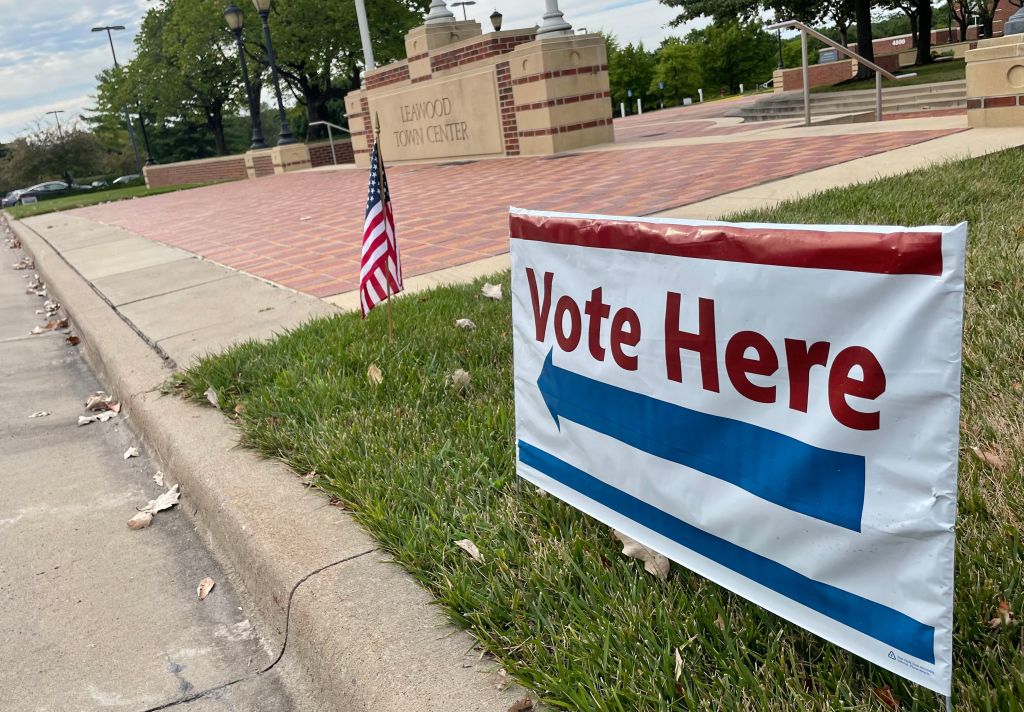Six Brutal Lessons America Hopefully Learned from the 2022 Midterms

Photo by CAITLIN WILSON/AFP via Getty Images
There are still several races left to call — most notably the Senate contests in Arizona and Nevada, the governor’s race in Arizona, and Georgia’s Senate battle is heading for a runoff — but we’re far enough through the 2022 midterm elections to be able to learn some brutal lessons from America’s latest electoral circus.
Democrats cannot take any segment of their base for granted.
Much ado has been made over former President Donald Trump’s ability to woo blue-collar Democrat voters, and that undoubtedly helped get him into the White House in 2016, but Republicans have also been making inroads with Hispanic voters for several election cycles.
As several commentators have pointed out, the short-lived Congressional tenure of Rep. Mayra Flores (R-TX) illustrates this point. She won her seat in a special election where Republican groups poured money into the race and Democrats largely ignored it, but then lost on Tuesday partly due to the district lines being redrawn to lean more Democratic but also because of the increased attention and financial support from the Democrats.
In another Rio Grande Valley congressional battle, Trump-endorsed Monica de la Cruz won, flipping a formerly solidly blue seat to red and following a trend of Latino voters in South Texas being more receptive to GOP outreach.
Florida Gov. Ron DeSantis (R) ran up the score in his victory against former governor/former Republican, Rep. Charlie Crist (D-FL), by building on previous inroads Republicans had made in Miami-Dade County. Having Sen. Marco Rubio (R-FL), a Miami native, at the top of the ticket undoubtedly helped the GOP turn Miami red.
The same lessons apply to other demographic groups. Neither party should take anyone’s vote for granted, and we’re better off as a country when the two major parties are energetically competing for support in a broader way.
Election denialism is for losers.
Promoting Trump’s baseless claims of 2020 election fraud does help energize a segment of the GOP base, without question, but it is irreparably toxic to independent and moderate voters. Republicans have won the messaging battle on a number of issues when the Democrats have strayed too far radically left — the “defund the police” movement in the wake of the George Floyd protests comes to mind as language that was anathema to even many Democratic voters — but promoting conspiracy theories about our elections and refusing to condemn the violence of the Jan. 6 attack on the U.S. Capitol is a step too far for many voters of all political persuasions.
Numerous conservative commentators have urged the MAGA base to move on from 2020 complaints, citing a need to look forward, not back, but it’s not just a problem of messaging style.
The reality is that election denialism is much more likely to cause a candidate to lose a competitive general election than win. The Washington Post tallied up all the candidates nationwide who had voiced support for Trump’s election fraud claims, and while most of the ones running in Republican-leaning districts won their races, those in toss-up or Democratic-leaning districts were annihilated at the ballot box.
This isn’t just a Republican vulnerability. Stacey Abrams (D) in Georgia indulged in her own election denialism about her previous loss to Gov. Brian Kemp (R), and he sailed past her for the second time this year.
Voters can care about more than one issue at once.
Shrek memorably told his friend Donkey that “ogres are like onions,” with many layers, and it turns out voters are a lot like ogres. (Or onions, as you prefer).
After the Supreme Court overturned Roe v. Wade, political commentators were in a frenzy speculating about how that might create a “blue wave” of furious liberal and female voters, rushing to vote down any restrictions to abortion access. Multiple states did in fact see a surge of women registering to vote in the wake of that case, Dobbs v. Jackson Women’s Health Organization.
But as the summer turned to fall, rising gas prices and inflation had the economy polling as a top issue for voters, and the majority of prognosticators expected a “red wave” instead, with Republicans benefitting from the usual midterm current dragging down a president’s own party.
President Joe Biden was mocked, even attacked, from his own side of the aisle for his recent speeches emphasizing opposing “Ultra MAGA” influences in our elections and protecting America’s democratic institutions. Conservative commentators, many of whom have downplayed the violence on Jan. 6, scoffed at Biden’s defense of democracy, certain that the kitchen table concerns would overshadow other issues.
In the end, though, it seems that voters are in fact able to acknowledge they are economically struggling, and the Democrats were in control of the White House and Congress, but still prioritize other issues enough to affect their votes. In a country of over 300 million people, there is not one issue that is going to be completely determinative of our national elections.
Paper ballots are absolutely necessary for election security.
Maricopa County, Arizona found itself in the harsh spotlight on Tuesday when some of the printers were not printing ballots dark enough to be properly read by the tabulation machines. It sparked a wildfire of conspiracy theories on right-wing social media, a lawsuit from the Arizona GOP and several other Republican groups and campaigns, and a whole lot of stress for the county election officials.
But you know what the tabulation machine problems didn’t do? Stop anyone from voting or delete or change anyone’s vote.
A Maricopa County judge denied the GOP lawsuit to extend voting hours after finding that there was “no evidence” any voter was denied the chance to vote, and the actual ballots any voters cast were safe and preserved. Affected voters were given the choice of going to another nearby voting center or completing their ballot and putting it in a secured box to be tabulated later.
In other words, the printer error just meant those ballots could not be tabulated at the voting center site, not that the votes were lost. It slowed down the counting; it did not prevent it or change any of the results. Each voter casting their vote with a paper ballot meant there was clear physical evidence of their intention that could be counted, regardless of any technological problems.
Having a paper trail was also critically important in the recount that was conducted in Georgia after the 2020 presidential election, when the physical hand recounts repeatedly confirmed the original machine count.
And as a native Floridian, I would be remiss if I didn’t mention Florida’s infamous 2000 election. Palm Beach County’s butterfly ballots and conflicting rules between various precincts in the affected counties all added to the chaos and anxiety of that presidential election recount, but at least there were physical ballots to examine and litigate.
The fragile butterfly ballots were wisely abandoned, but the basic marker or pen-paper ballot is an election institution that should not be abandoned, regardless of any expected technological advances, as an essential element of assuring voters of the integrity of the election process. The added expense is a non-negotiable investment in a functional democracy, and the local and state governments that administer our elections must continue to provide adequate budgetary support.
We need to have a conversation about polling.
Numerous pre-election polls predicted a “red wave” that never materialized, and we need to talk about how that went wrong and what we can all do to remedy it (yes, all of us…read on).
Political polling has gotten increasingly difficult to conduct as Americans have abandoned landline telephones and grown hostile to picking up calls from unknown numbers. I chuckled when I read the below tweet from NBC News’ Ben Collins, but he actually underestimated the problem.
A growing number of Americans do not have landlines at all, not just young people. Pollsters used to be able to call a phone number physically attached to the same home address where someone was registered to vote and now have to try to reach them online or on cell phones, which, even if they pick up, may be from an area code not connected to their current residence.
The growing number of independent/unaffiliated voters also makes polling more difficult to do accurately. Plus, partisan actors sometimes muddy the water by releasing polls that put the thumb on the lever just-oh-so-much for their side. The uncomfortable truth is that by adjusting the sample from any given demographic even slightly, a pollster can noticeably skew the results of the entire poll.
The public needs to be more skeptical in how they read polling news, and the media need to do our part to report responsibly.
For starters, any article reporting on a poll should link to the full poll (including cross tabs), provide the actual language used to question respondents, describe the polling methodology (online, landlines, cell phones, etc.), detailed demographic information (age, race, sex, party affiliation, geographic area, etc.), and a clear margin of error calculated for the entire sample size as well as for any significant subgroups that were polled.
It’s also worth pointing out that the hostility so many people show towards pollsters is unwarranted. I have not found any credible reporting of any poll respondent’s private information or personal responses being leaked or otherwise compromised, which should be immensely reassuring considering how many polls are conducted every election.
Perhaps a selfish reason might be better motivation? Considering how difficult it’s becoming for pollsters to get people to answer their calls and complete the survey, if you are willing to participate in a poll it means you’ll have an oversized influence. Want our government to reflect your personal preferences more? Tell a pollster.
The GOP must move on from Trump to survive as a viable political power.
Last but absolutely not least: it’s long past time for Trump to retire from politics. Since he seems increasingly unwilling to leave on his own, he’ll have to be forced out, and it’s up to the Republican leadership and conservative influencers to give him a good hard shove and bar the door behind him.
I’m a self-proclaimed Never Trumper, but before you dismiss my critique, I would point out how Trump causes catastrophic problems for the GOP that have nothing to do with anyone’s specific policy differences, partisan viewpoints, or objections to his personality flaws. On a purely practical matter, Trump has simply become toxic for the Republican Party and has no realistic hope of improving.
Trump’s endorsed candidates were a notorious flop with voters. From Mehmet Oz’s loss to John Fetterman for the Pennsylvania Senate seat to Sen. Maggie Hassan (D-NH) easily fending off a challenge from the Trump-backed Don Bolduc, the ex-president’s chosen candidates largely stumbled, except in deep red districts.
Trump is still the figurative elephant-in-the-room in the GOP, with his endorsement acting as a 5-ton weight on the scale in Republican primaries — but that same Trumpian stamp of approval acts as an anchor in the general elections, dragging down his picks into losing otherwise winnable races.
“Candidate quality” has been a talking point for these midterms — with even Senate Minority Leader Mitch McConnell (R-KY) publicly lamenting it as a serious problem for the GOP this cycle — and it cannot be emphasized enough that the way that Trump evaluates candidates is based far more on that individual candidate’s loyalty to Trump personally and willingness to support his baseless claims of fraud in the 2020 election than any sort of viability at the ballot box — not to mention ability to govern.
House Minority Leader Kevin McCarthy (R-CA) is already salivating at running for speaker, but his chance to do so depends on several outstanding House races falling into the R column, and that’s not guaranteed. McConnell is faced with once again watching his hopes of returning as majority leader depending on a Georgia Senate runoff where Trump’s interference may harm more than help. At some point, one would think that Republican leadership’s personal ambitions would motivate them to take decisive action to defend their turf.
The GOP establishment has shown some ability to take out the trash when they want to do so — most recently by shoving scandal-plagued Rep. Madison Cawthorn (R-NC) out of Congress by defeating him in the primary — so the idea that they are helpless to push back against Trump-endorsed primary contenders just doesn’t hold water.
The other undeniable problem Trump causes the party is financial. He’s shown an astonishing ability to draw in millions of dollars from his supporters through small-dollar donations and merchandise sales, but he spends almost none of that to help anyone but himself. With many of his donors coming from the middle and working class, they have finite resources, and a donation to a Trump PAC likely means they are not sending money to another Republican candidate or an official GOP party organization.
This cycle, Trump formed a new Super PAC right before the midterms called Make America Great Again Inc. (taking the place of Make America Great Again, Again! that was created last year) and also raised funds for his leadership PAC, Save America.
Save America piled up a massive war chest of over $100 million but spent very little of that on other GOP candidates. What it did spend largely went towards vengeance missions where it didn’t affect the end results like David Perdue’s failed primary challenge to Gov. Brian Kemp (R-GA) or Harriet Hageman’s primary romp over Rep. Liz Cheney (R-WY).
MAGA Inc. did drop several million dollars for television ad time in Ohio, Pennsylvania, Nevada, Georgia, and Arizona, but the buy was so late that they had to pay significantly inflated rates, meaning they got a lot less airtime than the same amount would have purchased if reserved earlier in the election cycle.
Meanwhile, J.D. Vance (R) managed to defeat Rep Tim Ryan (D-OH) in Ohio only after huge cash infusions from McConnell’s PAC and Peter Thiel. If Trump had directed more money into more states, it seems likely a few more seats could have dropped into the R column.
At 76 years old, the notoriously stubborn Trump isn’t going to suddenly adopt a calmer or more prudent personality. He’s also facing investigations in Fulton County, Georgia over his alleged efforts to interfere in the 2020 election, in New York targeting his business operations, as well as the looming possibility that the Department of Justice indicts him over the Jan. 6 attack on the U.S. Capitol or other actions to attempt to overturn the 2020 election results. You’d have to be consuming copious quantities of hallucinogens to think any of that would make the former White House denizen any easier to control.
In the famous Hans Christian Andersen folktale “The Emperor’s New Clothes,” no one wants to admit that it’s not that the emperor’s purported new garments are magically invisible, he just isn’t actually wearing any clothes at all, until a child blurts out the truth and the townspeople concede the facts. The Murdoch media empire — including Fox News, The Wall Street Journal, and The New York Post — has been increasingly accusing Trump 2024 of metaphorically not wearing any clothes, but key GOP elected officials and influential voices within the conservative movement will need to stand strong on this point to have any hope of moving the party (and the country) forward from Trump.
Follow Mediaite’s coverage of the 2022 midterms here.
This is an opinion piece. The views expressed in this article are those of just the author.




